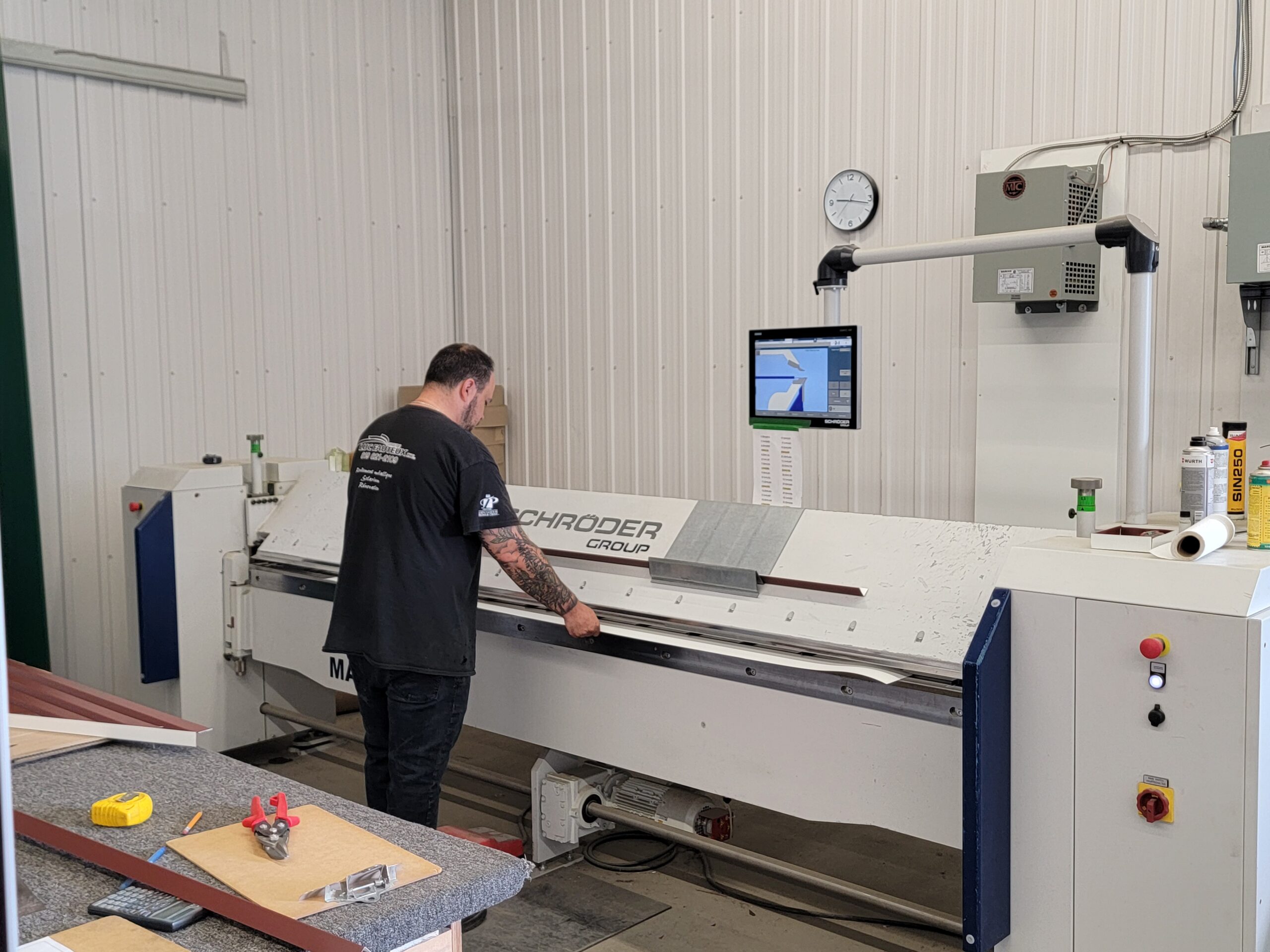Digital Bending: Revolutionizing Precision and Efficiency in Construction
In a sector where precision and efficiency are paramount, digital folding is emerging as an essential solution.
This innovative process, which uses numerical control technologies, is transforming the way materials are shaped and integrated into modern construction projects.
At Groupe Luc Fauteux, we use digital folding to offer our customers impeccable, made-to-measure results.
Discover how this technology improves the quality, speed and cost-effectiveness of construction.
While meeting the most complex architectural requirements.
Understanding Digital Folding in Construction
The digital bending represents a revolution in the construction industry. It brings greater precision and efficiency to the manufacture of materials.
This process uses advanced technologies to shape materials, often metals, into specific forms via numerical controls.
Digital control ensures unrivalled precision.
Reducing the risk of human error and optimizing construction quality.
Fundamentals of Digital Folding
Digital bending relies on the use of numerically controlled (CNC) machines that follow precise instructions programmed by specialized software.
These machines can handle metal with an accuracy and consistency that only numerical control can offer.
The process begins with the input of design data into the software, which then converts this information into commands for the bending machine.
This method enables complex, repetitive bending operations to be carried out without any loss of quality.
Digital Folding Strategic Objectives
The main aim of digital bending is to maximize the efficiency and profitability of construction projects.
By eliminating manual errors and reducing material waste, companies can make significant savings on production costs.
What’s more, the ability to rapidly produce custom-made parts means greater flexibility in architectural design and easier adaptation to specific customer needs.
Advantages of Digital Folding for Modern Projects
The adoption of digital bending enables manufacturers to respond more effectively to market demands for customized, innovative structures.
Whether for uniquely shaped building facades.
complex infrastructures or precise decorative elements, digital bending offers suitable, durable solutions.
It also contributes to the environmental performance of projects by minimizing waste and optimizing the use of resources.
Why choose digital folding?
Opting for digital folding means choosing innovation and durability. At Groupe Luc FauteuxAt Groupe Luc Fauteux, we integrate this technology to guarantee our customers the highest quality construction, on time and on budget.
Our experts use state-of-the-art equipment to transform your architectural visions into tangible reality with maximum precision and efficiency.
Types of Digital Folding Machines
The choice of digital bending machine is crucial, and depends on the specifics of the project.
Visit CNC press brakes are available in several types:
- HydraulicIdeal for their strength and ability to handle large volumes of metal, perfect for heavy construction.
- ElectricRecognized for their speed and precision, they are preferred for work requiring great finesse.
- HybridsCombining hydraulic and electric technologies, they offer a balance between power and energy savings.
These advanced technologies enable precise execution of complex designs.
All while reducing labor costs and human error.
Design and Simulation Software
The precision of digital bending is also supported by computer-aided design (CAD) software such as AutoCAD software such as AutoCAD or SolidWorks, which enable parts to be drawn in 3D prior to manufacture.
Software like BendCAM then helps convert these drawings into operational instructions for the machines.
The simulation of these processes is a crucial step in anticipating and correcting potential errors, thus ensuring defect-free manufacturing.
Folding Materials and Techniques
Digital bending is often used with materials such as steel, aluminum and titanium alloys.
Each material reacts differently under pressure and requires specific adjustments to the machine parameters to avoid cracks or deformation.
This ability to adjust parameters to suit the material is one of the major advantages of CNC technology.
Construction applications
Digital bending has a wide range of applications, including the manufacture of metal facades and load-bearing structures for modern buildings.
This technique enables bold architectural designs that would be difficult, if not impossible, to produce using traditional methods.
It is also used to create precise, personalized decorative elements that add aesthetic value to buildings.
Sustainability and Ecological Impact
The ecological aspect of digital folding is significant.
By optimizing the use of materials and reducing waste, this technology contributes to the reduction of greenhouse gas emissions. sustainability in construction projects.
Modern CNC machines are also designed to be more energy-efficient, reducing the carbon footprint of manufacturing processes.
Future trends
The future of digital folding could see increased integration of artificial intelligence to further optimize design and manufacturing processes.
AI could enable machines to make real-time decisions to adjust bending parameters.
This will improve the quality of finished products and further reduce production costs.
In short, digital bending is more than just a technological advance.
It represents a fundamental transformation in the way materials are handled and used in modern construction.
Thanks to its precision, efficiency and waste-reduction capabilities.
This method paves the way for more sustainable, economical and innovative construction projects.
At Groupe Luc Fauteux, we’re proud to be leading this revolution by integrating digital bending into our processes to offer our customers solutions that match their architectural ambitions.
Embracing this technology today means building solid, responsible foundations for tomorrow’s buildings.
Thanks for reading, see you at the next blog!
If you have any questions or would like to tell us about your project, please contact us at reception@groupelucfauteux.qc.ca or call 1-800-823-2109.

